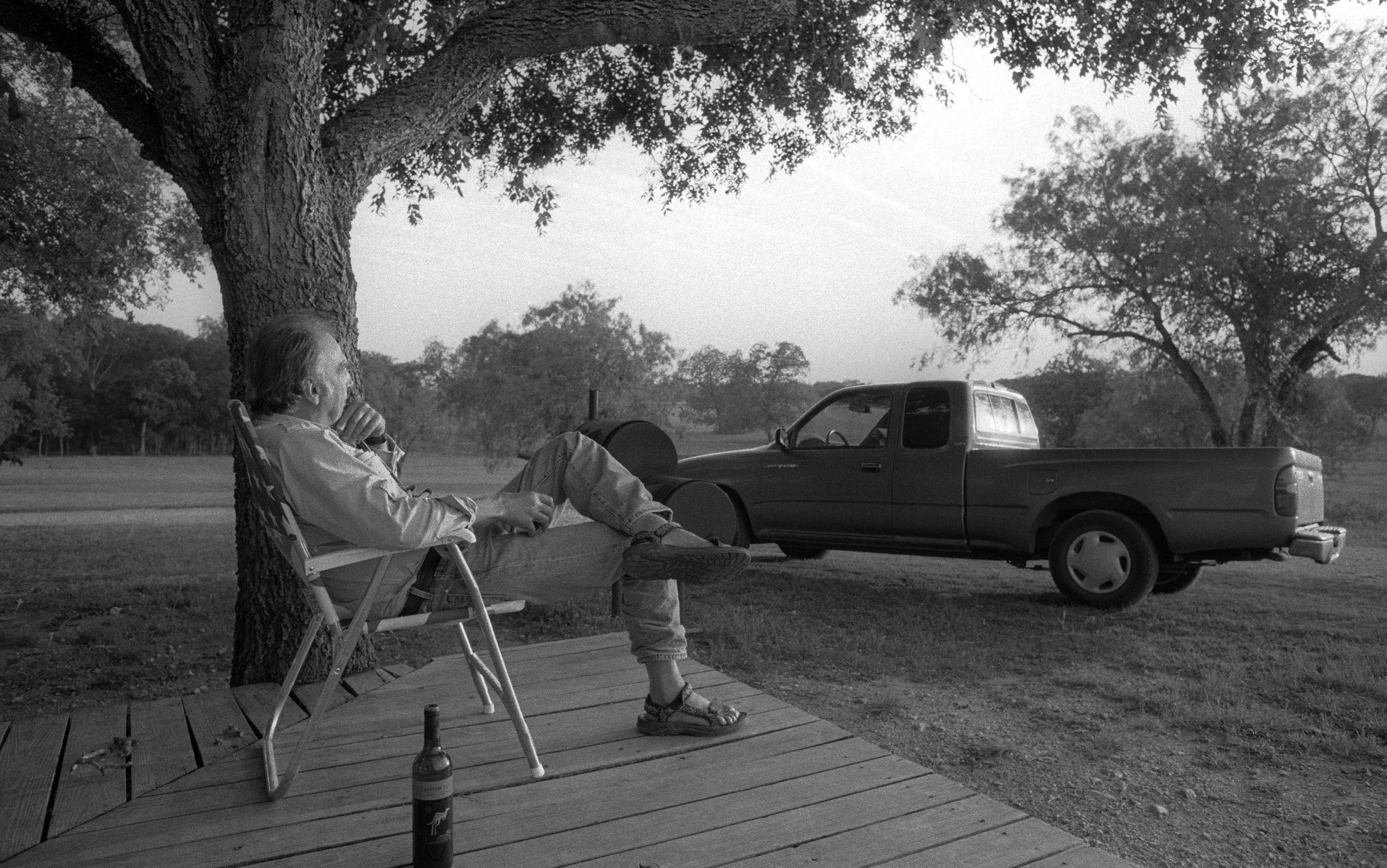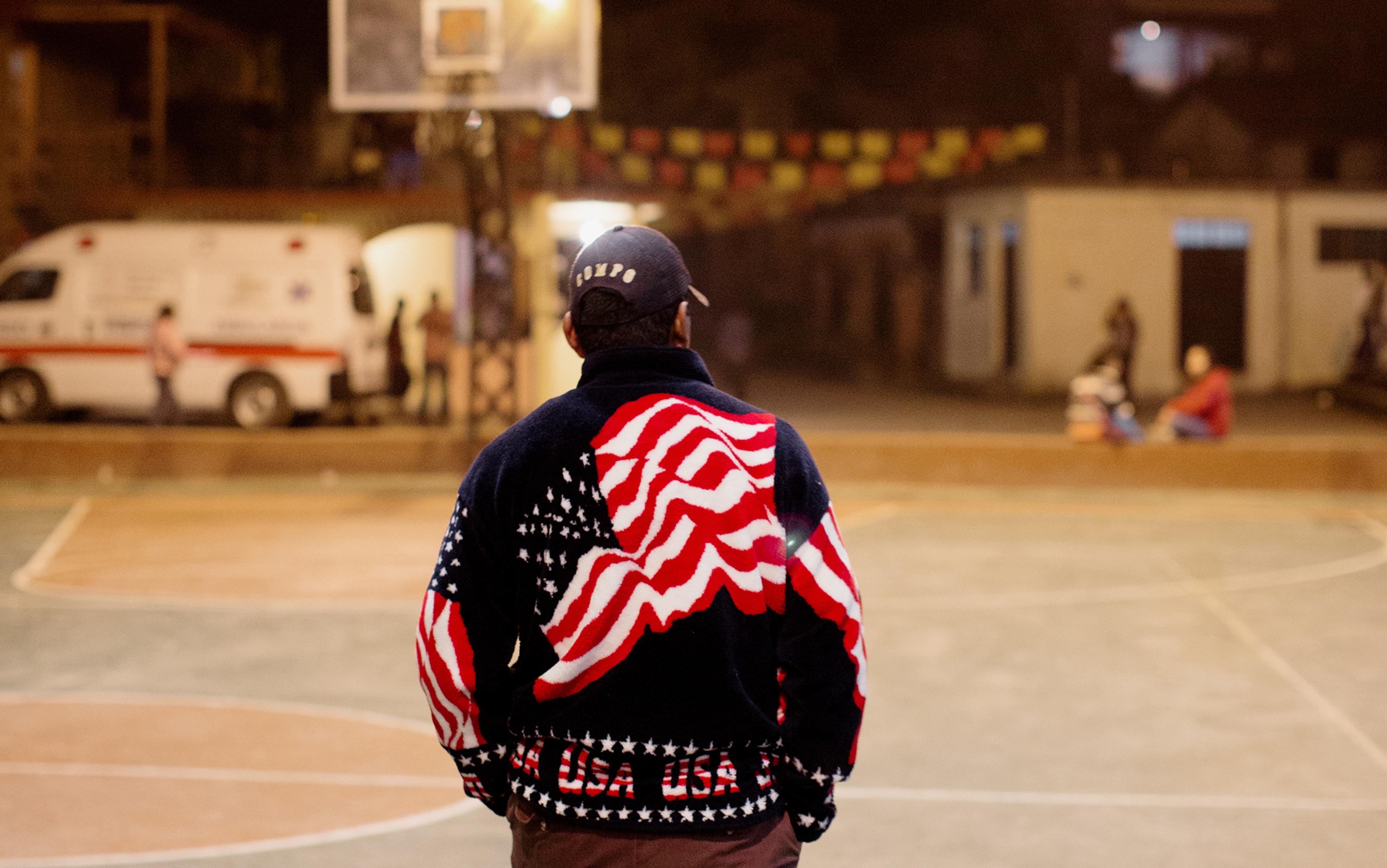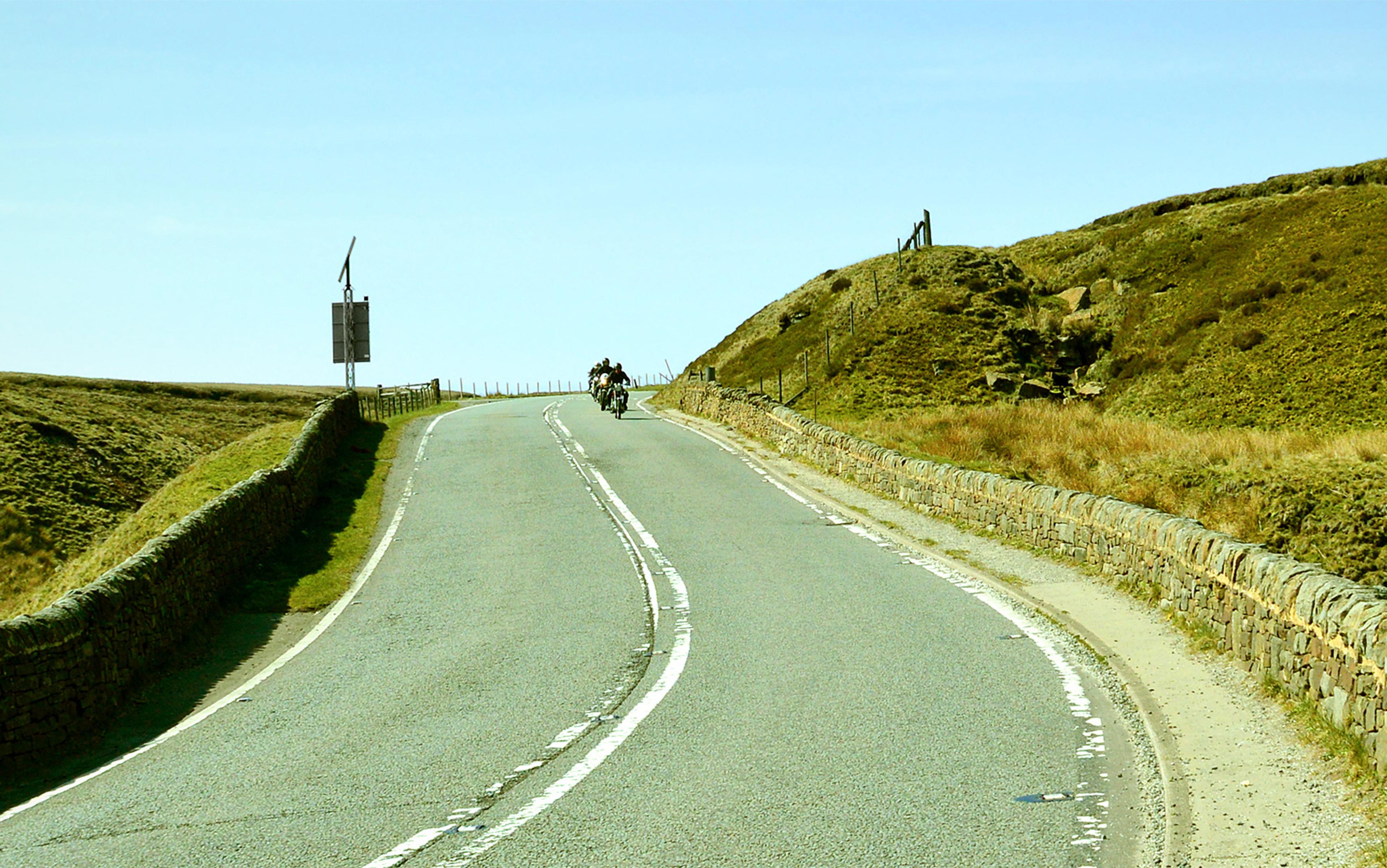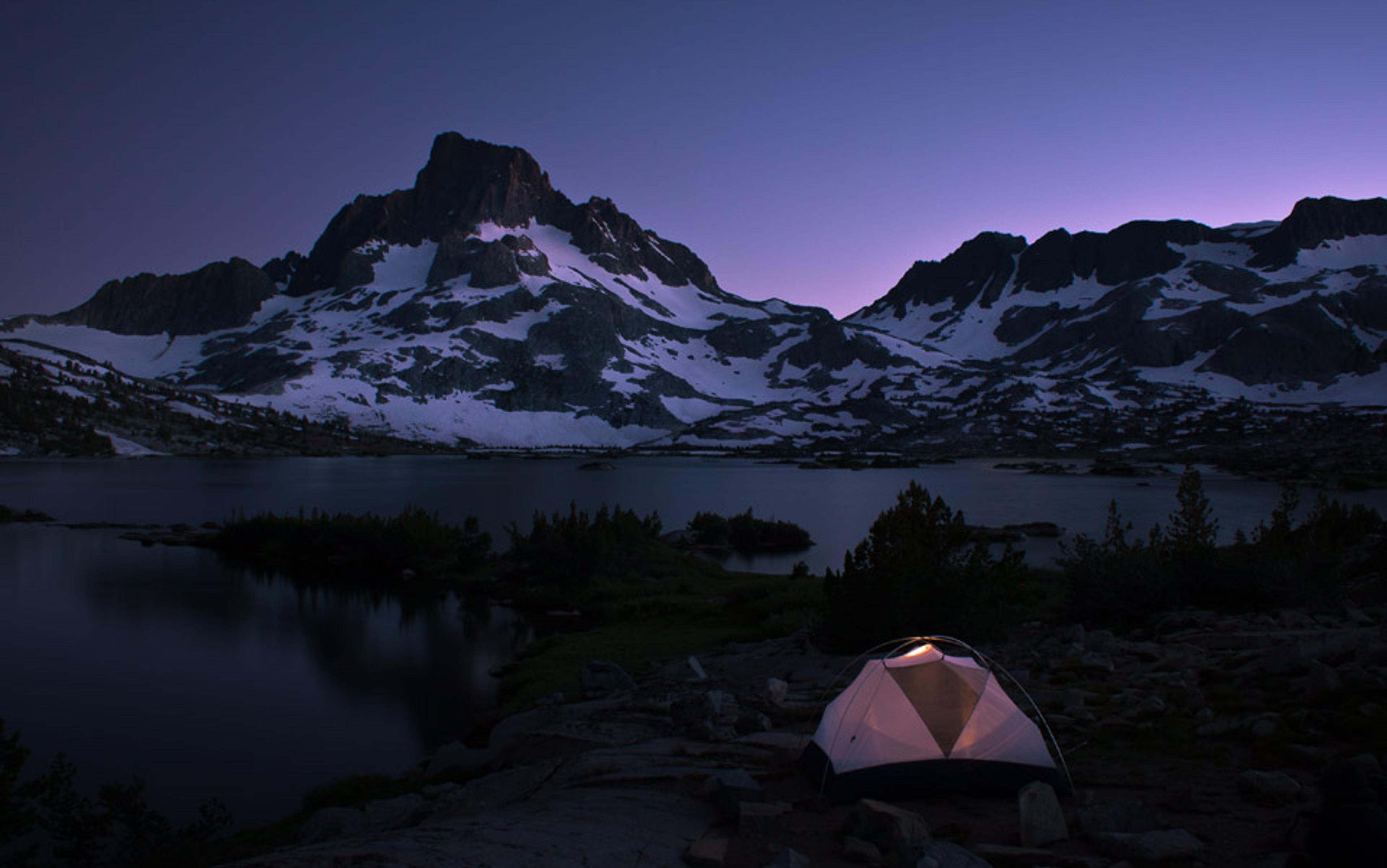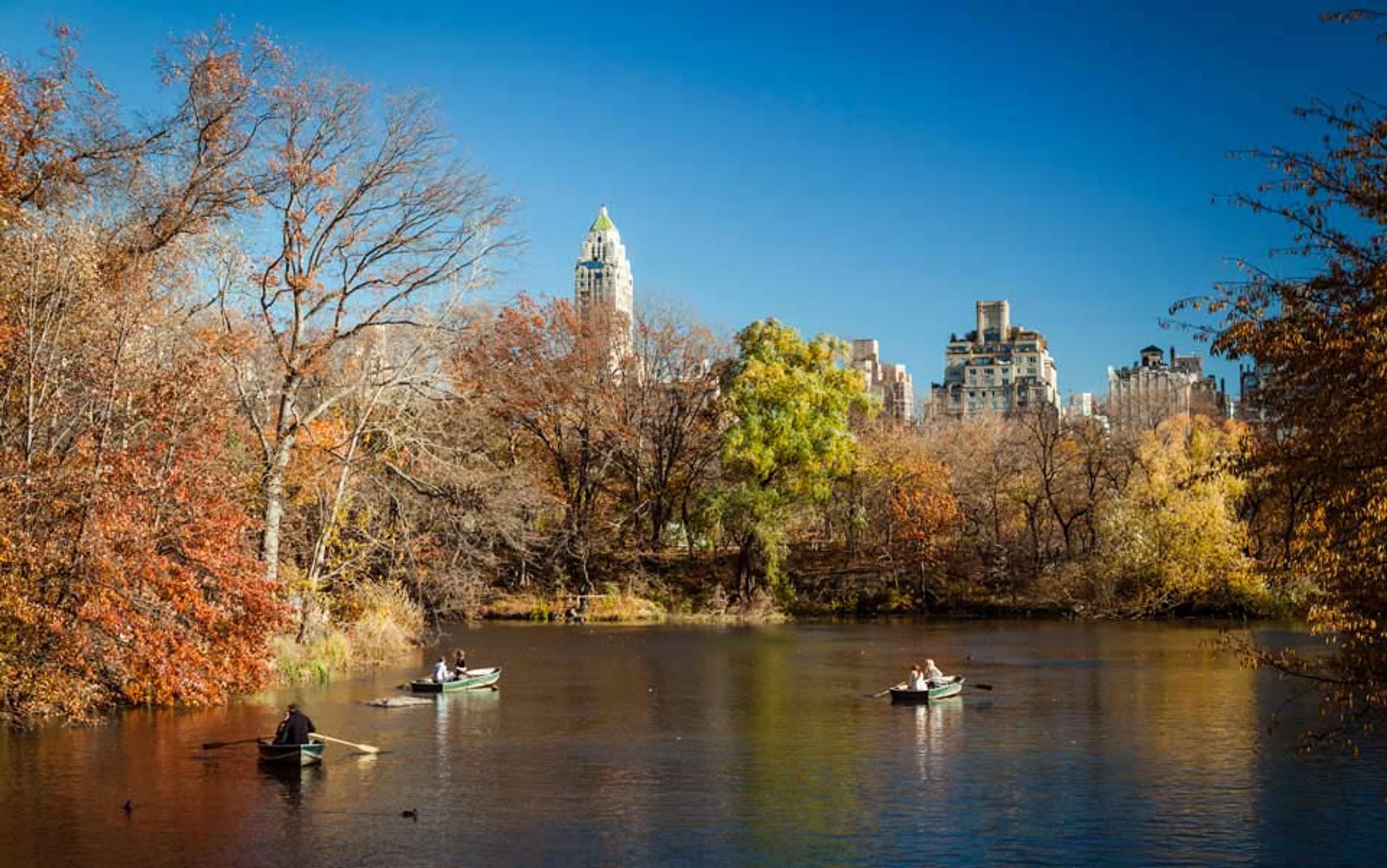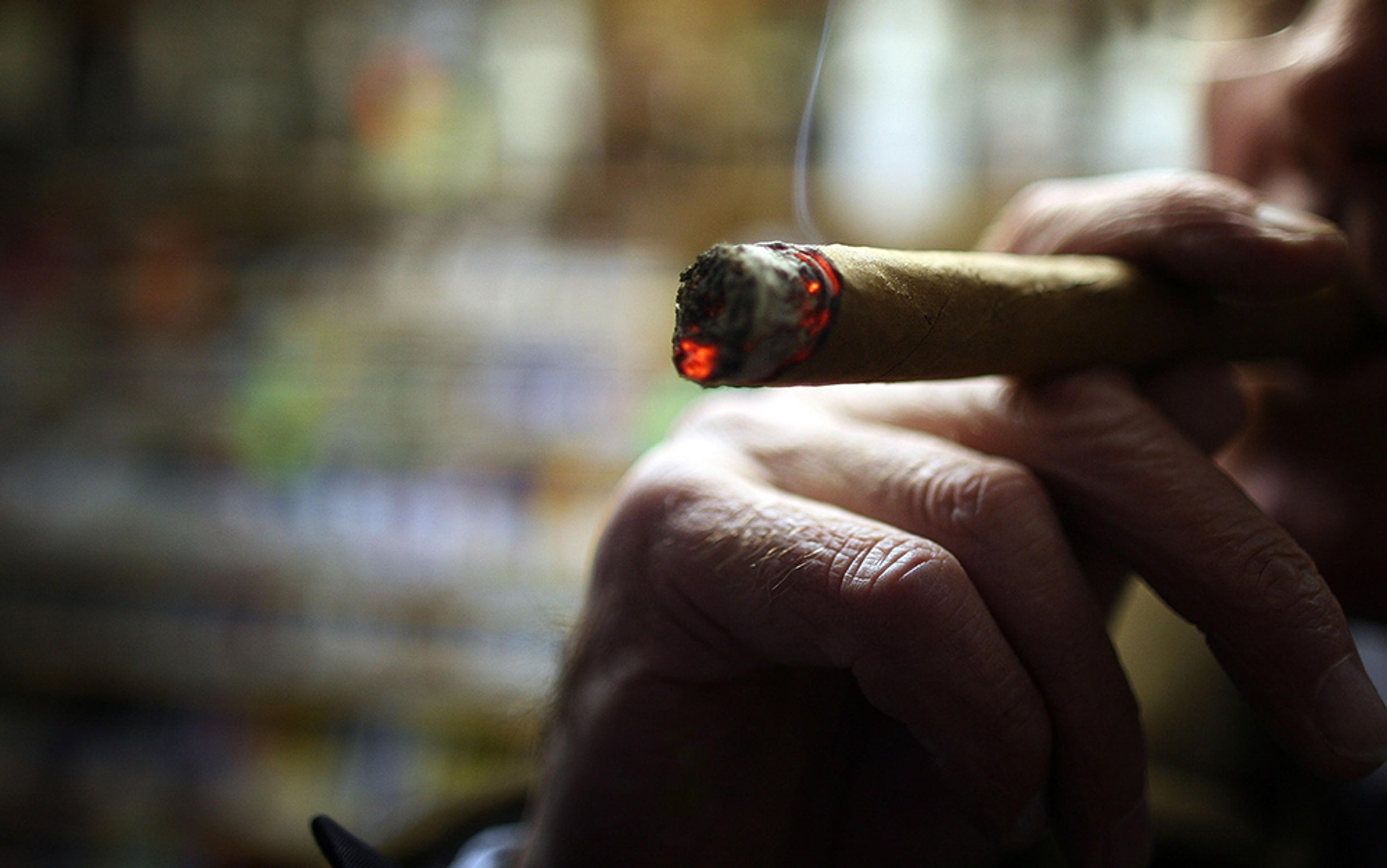Last August, when I heard that he’d died – peacefully in his sleep aged 69, and not gunned down by cartel assassins, as so many had predicted – I bought six yellow peppers and a bottle of cheap hearty red wine. He disapproved of white wine, finding it pale and insipid. In his writing and his life, he was a champion of boldness, lushness, vibrancy. Why drink wine that looked like watery urine, he argued, when you could drink wine the colour of rubies and blood?
Charles Bowden was the name on his books and magazine stories, but in person he was always Chuck. Tall, rangy and rugged, he had blunt handsome features, blue eyes that seemed to devour his surroundings, hair that wanted to climb back down his collar into the 1960s. Some genius said he looked like Robert Mitchum crossed with Neil Young, and that can’t be improved upon as a physical description.
He was always deeply tanned. He would lie out in the desert sun for hours, smoking unfiltered Lucky Strikes, and reading big scholarly books about his latest obsessions, which ranged from medieval trade routes to rattlesnakes, American jurisprudence to Italian food. It was a way of feeding his intellect, decompressing after writing, and drinking in heat and light through his skin. He had no fear of skin cancer, lung cancer, or other ways of dying. ‘What’s the difference,’ he would growl. ‘No one gets out alive.’
He went to bed early after copious amounts of wine, got up at three in the morning, and went straight to his keyboard with strong black coffee. He wrote for eight or nine hours on a normal day, 15 or 16 hours if the crunch was on, and he almost never took a day off or a vacation. By this method, he produced 26 books of utterly distinctive non-fiction, and hundreds of magazine articles. At his best, in Desierto: Memories of the Future (1991), or Down by the River: Drugs, Money, Murder and Family (2002), he was searing, incandescent, incomparable, a hard-nosed reporter who wrote like a poet or a fire-breathing prophet, and seemed wired into the deepest currents of his time. At his worst, he was overblown, macho, teetering on self-parody – too many perfumed whores and fierce dark hungers in the midnight streets.
He was always willing to risk his life to get the story, and the deeper he got into the Mexican drug world, exposing cartel bosses and the role of the army, the more urgent and extreme that risk became. Bodyguards accompanied him on occasion. He started keeping guns within reach at all times. His contacts in the US Drug Enforcement Administration said there were three contracts out on his life. If Chuck Bowden ever wanted to commit suicide, people said, all he’d have to do was stand on a street corner in Ciudad Juárez and wait for half an hour.
Risk was there in his prose, too. He gambled with structure and tone. Writing about a brilliant, charismatic, amoral financier, he interspersed the story with observations on mountain lions, suggesting that both were predators following their instinctual desires. In 2007, in an essay for Esquire called ‘The Bone Garden of Desire’, he constructed a mosaic of vignettes about food and death. When your friends are dying, he advised, go into the kitchen, cook well, savour the flavours on your tongue. So I lay the yellow peppers on the blue flames of the stove, and start chopping the onions, carrots and other vegetables.
He grew up in Chicago, and it was still there in his accent, and his no-bullshit attitude, but he lived most of his life in Tucson, Arizona. When I pitched up there in the early 1990s, as a fledgling journalist and uprooted Englishman, we became friends. We shared an irreverent outlook towards rules and authority. We both liked drinking and books and the outdoors. In the early years of our friendship, there was a strong element of mentorship on his part. I seldom left his house without important books to read, sage advice, an idea for a story, a useful contact, and some insight that he’d tossed off ringing in my head like a gong. He taught me most of what I know about Mexico and the Southwest, ecology and the environment, US politics, history, crime, and journalism. But the deepest lesson I absorbed from him had nothing to do with words or ideas.
I had never met anyone whose senses were so hungry and alive. Even when interviewing a cartel enforcer about the unbelievable atrocities he had committed, Chuck’s fingertips would be registering the texture of the tabletop that lay between them, because he was incapable of ignoring such a thing. He lived in a place where the thermometer stays above 100°F for months on end, yet he disapproved strongly of air conditioning, because it cocooned people from the physical reality of where they lived. He wanted to melt into the heat and become one with it. He thought sex in the summertime was all the better for being sweaty and overheated, and he thundered against air conditioning for ruining it.
Unless he was working, cooking or sleeping, he was seldom inside his house. His real home was in the backyard, where the walls were painted in bright, Mexican-inspired colours. Hummingbirds dive-bombed each other at the feeders, the males flashing iridescent green, purple and ruby at their throats. There was shade from a spreading mesquite tree, and the beds were planted with cactus and succulents. When the night-blooming cereus unfurled their outrageous flowers in midsummer, Chuck would hold parties in their honour, and plunge his face into the spreading, heavily scented white blooms with the purest ecstasy.
Chuck’s sensory awareness offered a kind of refuge, a last-ditch hope of an honest connection to a real, living world
He relished intense heat, bitter cold, thunderstorms, and reeking pitch-black bat caves. He craved sensory bombardment, and loved everything that amplified the feeling of being physically alive, right here, right now, in the present moment. Television bored him. It was a cold dead machine dispensing clichés and imitating life in two dimensions. He never went to the movies, to gaze at a screen with a herd of silent strangers in a climate-controlled room. He loved wine, but he had no interest in identifying its characteristics, or analysing its nuances. If it was big and red, sluicing across his palate, and coursing through his bloodstream, he was delighted by it.
For me, a generation younger, and far more colonised by technology, media and marketing, Chuck’s sensory awareness offered a kind of refuge, a last-ditch hope of an honest connection to a real, living world. I felt so barraged by lies, hounded by sales pitches, invaded by false images and bogus yearnings. Everywhere I turned, there was another billboard, another commercial, another politician, another fairytale strewn with product placements on a screen. How could I trust my own thoughts and desires when they had been exposed to such a vast mechanism of manipulation? Meanwhile, this new thing called the internet was busily eating away at my attention span, sucking away at my time, and creating a twitchy new form of existential dissatisfaction. Almost anything I might want to know, or buy, or look at, was two clicks away, including vast oceans of free pornography.
Chuck, who lusted mightily after women, disliked porn. It was dishonest, he said. It was for people dead from the neck down. For me, it was both exciting and depressing to have so much porn at my fingertips. It was a further encroachment into my deepest human desires. It was a mass outsourcing of our sexual imaginations to professional actors and production companies, and narcissistic amateurs with cameras and internet connections. How many of us even dream up our own sexual fantasies any more, when it’s so easy and effective to select one from a menu of options? Women have been telling me about men who seem distant and disconnected in bed, as if porn has become real, and sex has become virtual.
As modern life became more processed, filtered, and digital, delivered through screens to the eyes and brain, I decided to open up another avenue of consciousness by cultivating my senses. I’d always listened very closely to music. Now I started listening in the same way to birdsong, insect noise, the different sounds that wind and traffic can make, the rhythms that form and dissolve in the urban grind and clatter. When people came to my wooden-floored house, I paid close attention to the weight and rhythm of their footsteps, and tried to learn the sound of their gaits, so I could recognise them as they walked up the stone path to the front door.
The more I tried to listen, the more I realised that my ears were accustomed to ignoring and blocking out sounds, and that they rang faintly all the time when it was quiet. I assumed it was damage from loud music and cities. Then I went out into the desert, at Chuck’s suggestion, and spent five days there on foot. After three days in that immense austere silence, broken only by the occasional owl hoot, coyote yip, gust of wind hissing through cactus needles, crunch of hiking boot, the ringing in my ears was gone. On the fourth day, lying there in the shade of a stunted palo verde tree, waiting out the afternoon heat, with the air perfectly still, and all the birds and animals motionless in the shade, I became aware of a very faint rushing sound coming from my body, similar to what you hear in a seashell. As far as I can determine, it was the sound of my blood circulating.
After three days in the desert, all the senses start to blossom into life, and the most dramatic change takes place in the eyes. For the first time, you notice a small inconspicuous grayish plant with rusty splotches on its leaves. Then you look around and realise that they’re growing everywhere. Now you can’t fail to see them. The same thing happens with dozens of other visual details in the landscape. You start to see all the animal tracks, spider holes, desiccated droppings, bird nests. The camouflage of stationary lizards becomes less effective. What appeared at first to be a brownish rocky desert plain now abounds in pinks, purples, greys, ochres, tans and greens.
As the peripheral vision starts to engage, the eyes become more sensitive to movement, and you start seeing more wildlife. Once we needed these senses to hunt, gather and survive, and we kept them sharp and honed. Now they lie dormant within us, rusty and dull from lack of use. Modern life trains us to see in tunnel vision. We focus on screens, books, faces, the road ahead, leaving the peripheries blind and forgotten.
No one walks around Ciudad Juárez, or Mogadishu, or the Ninth Ward in New Orleans, with their eyes glued to a smartphone
The danger of treading on a rattlesnake, 20 or 30 miles from the nearest road, also helps to concentrate the eyesight, and the ears are always listening for that sinister, husky, buzzing sound. Any kind of danger heightens sensory awareness. It’s an entirely different experience to walk in mountains where grizzly bears live, even if you never see so much as a footprint, or a clawmark on a tree. Looking, listening, sniffing the air for signs of bear, you become acutely aware of any movement in the landscape, or any shape or colour that seems to break the pattern.
The same thing happens in dangerous urban environments. No one walks around Ciudad Juárez, or Mogadishu, or the Ninth Ward in New Orleans, with their eyes glued to a smartphone. Alert to the possibility of danger, they’re watching the body language of an 11-year-old on a street corner three blocks away, a vehicle they don’t recognise, a pause or a quickening in the normal rhythm of the street, unusually loud noises or unusual quietness. They use window reflections to see around corners, and no matter how hard you try, as an outsider, you will never be able to read the streets as well as they do.
The people with the sharpest senses of all are those still using them for their original purpose. In Tanzania, I spent a few days with the Hadzabe people, who hunt their meat with bows and arrows, gather wild honey, fruits, seeds, roots and tubers, and live in caves or temporary huts. Their DNA comes straight down the main line from the earliest Homo sapiens, who evolved nearby in the Rift Valley, and their lifestyle has changed very little over the millennia. The hunters could identify sounds that I couldn’t hear at all, because the animals making them were nearly two kilometers away. They could spot stationary creatures hiding in thornscrub patches that I couldn’t see with binoculars, even as they pointed and pointed, and then gave up laughing. It was the same in Mexico with the Tarahumara tribe, in the Kalahari with the San people. To them, I was an oaf who stumbled around half-blind and half-deaf in a kind of fog.
Chuck Bowden had an analogous experience while hiking in Madera Canyon in south-eastern Arizona. Birders were there from all over the US and Canada, in hopes of seeing a spectacular migrant called the elegant trogon, along with elf owls, painted redstarts, sulphur-bellied flycatchers, and 15 species of hummingbird. Chuck started talking to the birders, and they started pointing out birds to him, except that half the time Chuck couldn’t see the birds, even when they loaned him their binoculars. It would take him a few minutes with careful direction to find the telltale ear tuft of a sleeping owl in a thicket 70 yards away, but they had spotted it almost instantly. They could differentiate tiny variations of plumage colouration on birds darting around in the treetops. Because of their superior vision, the birders were having a richer, more vibrant sensory experience than he was.
he needed every ounce of arrogance to keep doubt away and keep writing what he truly believed
Back in Tucson, Chuck bought himself a good lightweight pair of binoculars, and set about learning the 250 bird species that frequent Southern Arizona. Unlike most of his obsessions, which flared and subsided, and were replaced by the next one, watching birds became a steadily accumulating source of pleasure. He didn’t tick them off lists. There was no goal in mind. He was in it for the visual delight, and he never stopped marvelling at their ability to fly.
In time, we both left Tucson. Chuck moved to New Mexico, and I went off to Africa and New York, and then Mississippi. We stayed in touch through irregular email exchanges, and occasional telephone calls. I stopped in to see him a few times when driving across the country, and once bumped into him by accident in a small town in West Texas. We still had that ease in each other’s company. We still had the ability to entertain each other, a key aspect of male friendship. The mentorship had faded away over the years, and a kind of camaraderie had expanded to fill the space. But it was still an unequal relationship.
He was older, wiser, smarter, more talented, forceful and charismatic. He still did most of the talking, and most of the interrupting. Even when he was dismissive and scornful, to me or someone else in the room, I never called him on his rudeness. It was part of his arrogance, and he needed every ounce of arrogance to keep doubt away and keep writing what he truly believed.
When the peppers are charred all over, I put them in a bag to steam their skins loose. I pour the wine, swirl it and sniff. This was his everyday plonk: Aussie shiraz, rough and surly around the edges, high in alcohol, flavours of tar and cherry cheesecake. He drank it from a scuffed-up water tumbler, and scorned my habit of swirling and sniffing. ‘I like to drink the goddamn stuff,’ he would growl.
Chuck was also rough and surly around the edges. When I first met him, his house was the lair of a beast who worked and drank and smoked and never cleaned. He complained of jealous women looking through his kitchen windows, trying to catch a glimpse of their rivals. Rather than put up blinds or curtains, he smeared the window glass with pork fat to foil their prying eyes.
He drank instant coffee, and subsisted on cheap Mexican food and thrifty stews. Wine came from a box or a jug, except on special occasions, or when checks arrived. As a writer, he was a regional cult figure, and he lived without complaint in the poverty of that position. Then a woman moved in. The house became clean and civilised, and Chuck decamped to a shed. He started winning awards, and writing big articles for national magazines such as Esquire, GQ, Mother Jones, National Geographic. He was making some real money now, and he used it to buy time. He needed the time to work on his books, which mattered more than anything else in his life, but never provided him with a living.
Words flowed out of him relentlessly. One reason he drank so much wine was to staunch that flow, and get some respite. Sometimes he’d write 20,000 words in a few days, sitting there at the computer in a kind of trance, not really looking at the screen. Phone calls lasted two hours on average, and he dominated conversations. His monologues were brilliant and bombastic, loaded with erudition, peppered with wit, nimble-footed in making connections and leaping to conclusions.
‘Lookit,’ he would say in that Chicago accent, before launching into the next phase. ‘Ya follow?’ he would check afterwards, and it didn’t matter if you did, or didn’t, because he was going to bulldoze on regardless.
Money also allowed him to explore his sense of taste. Food and cooking became the great new obsession. Delicious fragrances emanated from his kitchen, and he slaved over cookbooks at night. The late Marcella Hazan was a particular favourite. Her recipes were designed to express the flavour of the main ingredients as fully as possible, rather than disguise and manipulate them, in the way of French haute cuisine. He persuaded a magazine to send him to her cooking school in Venice, and he returned with a new passion for espresso, and a simple, perfect, sublime recipe for roasted yellow pepper soup.
Chuck would walk through any patchy vegetation, refusing to deviate his course, enjoying the sensation of thorns raking across his skin
Using a thumbnail, peel the charred skins from the peppers, collect the clear juices, and slice up the flesh. In large pot, sauté the onion, carrot and celery in olive oil until soft. Add the sliced peppers and salt, cook for a few minutes. Add diced potatoes, chicken stock and water. Cook for 20 minutes until the potatoes are soft. Purée in batches, serve in bowls, drizzle with olive oil and the clear pepper juice.
I hold on to the flavours with my mouth. They’re rich, direct, uncluttered, mesmerising, like his best prose. I remember the look of innocent pleasure on his weathered face as he watched the hummingbirds, the unabashed sexuality as he plunged his face into the crotch of a flower, the scabs and lacerations on his legs after his long marches across the desert. Rather than walk around the patchy vegetation, Chuck would walk through it, refusing to deviate his course, and presumably enjoying the sensation of thorns and twigs raking across his skin.
He had the most interesting and original mind that I ever got to know well. It cut right through the conventional wisdom and surface veneer to the stark uncomfortable truth. His intellectual honesty compelled him to fully acknowledge the horrors and pointlessness of the human experiment in this world, but he never lost his sense of wonder or curiosity. Even as he catalogued the monstrous dystopias emerging from social and political collapse in Mexico, even as he prophesied the bleakest of futures for our ransacked planet, his love of life was undiminished – mainly because he could take such pleasure from the colour of a bird’s throat, the feel of a woman’s thigh under his fingertips, the rain falling like arrows on the desert as the sky convulsed in thunder.
Considering how much time we spent drinking together, over the course of 20 years, it’s odd that I didn’t know him better. He had that old-fashioned masculine privacy about his innermost feelings, except for anger which he couldn’t contain. He loathed hypocrisy, pretension, piety and smugness, especially when they emanated from the rich and privileged. Dishonesty caused his anger to flare, because he was deeply moral. Finding so many human institutions lacking in morality, and engaged in deception, he was an iconoclast and provocateur. On literary panels, or at any kind of formal event, he was a loose cannon, who felt almost honour-bound to insult somebody, or perhaps everyone in the room, with some growling cantankerous remark, or fuck-you cigarette.
The world will be a more boring and polite place without him, at least for me and those who knew him, or followed his writing. A few iotas less of truth will be spoken to power. He was a lion and a screech-owl, a hard charger, and a rough glass of cheap red wine.
